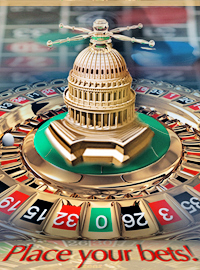| Investment Fund Shows That Betting Against Congress is a Great Way to Make Money |
 |
|
By Ashton Ellis
Thursday, August 12 2010 |
With Congress out of session for its August recess, one innovative fund manager is busy making money for clients who share his view that an inactive government is good for the stock market. Armed with data and a successful track record, Eric Singer is using his unique strategy to make profits and a point about avoiding the most dangerous element in any investment decision: political risk. Singer’s Congressional Effect Fund takes its name from the phenomenon he helped prove: when Congress acts, markets suffer. In 1992 while working for a New York investment firm, Singer noticed a recurring pattern of exceptional stock performance. The “January effect,” was followed by stock market “rallies” during the summer, at Thanksgiving and Christmas. It occurred to him that in each boom period Congress was out of session. So, he looked at the data to see if there was a correlation. Going back to January 1, 1965, Singer studied the performance of the S&P 500 Index on days when at least one house of Congress was in session compared to when neither house met for business. The results confirmed his intuition. On days when at least one house was in session, the S&P 500 had an average annualized price gain of +.94%. Alternatively, the Index gained +16.04% when neither house was in session. The explanation is simple. Investors fear government action because it always involves change. Changes in rules and regulations cause uncertainty. That uncertainty leads to risk-averse behavior like banks reducing lending, landowners refusing to develop real estate and employers refusing to hire more staff. By driving wealth creators to the sidelines, government action makes the nation poorer. Though intuitive to most business owners, the “congressional effect” is hardly conventional wisdom with financiers or academics. When Singer first published his findings a team of experts tried to disprove him. They ended up making an even stronger case for Singer’s position. In a 1997 study titled, “The Congressional Calendar and Stock Market Performance,” three university professors and a private financier concluded: “Almost the entire advance in the market since 1897 corresponds to the periods when Congress is in recess. This is an impressive result, given that Congress is in recess about half as long as in session. Furthermore, average daily returns when Congress is not meeting are almost eight times greater than when Congress is in session. Throughout the year, cumulative returns during recess are thirteen times that experienced while Congress is in session.” What to do when Congress is in session? Singer gets out of the stock market and converts his fund’s holdings into interest-bearing instruments like Treasury bills. When both houses are on vacation, he plunges back into the trading world. Singer notes that following such a strategy with $1 invested in 1897 to the present would have netted an investor over $300.00, while leaving another $1 constantly in the market over the same time would have netted less than $2.00. Through the end of August 10th, Singer’s fund was in the top 1% of the 1,200 mutual funds considered to be its peers by Morningstar, a leading mutual fund analyst. A recent example of the congressional effect was the damage done to the stock value of UnitedHealth Group with the government takeover of the health care industry. In 2006, UnitedHealth Group’s stock was trading at $55-60 a share. During the 2008 campaign when a government-run public health care option was being touted, its stock dove to $20 a share. After passage of ObamaCare, it has only managed to climb back up to $33 a share. And, with most of ObamaCare’s regulations yet to be written, the resulting uncertainty about investing in the private health care industry means UnitedHealth Group is unlikely to recoup its former value any time soon. Why would it when many of the big investment opportunities in health care now seem to be securing government contracts? With the federal Department of Health and Human Services becoming the last word on products and services, the congressional effect of ObamaCare is to reorient an entire industry toward pleasing bureaucrats, not consumers. As Singer points out, the 20th Century is filled with such examples. The Republican-backed Smoot-Hawley Act of 1930 touched off an international round of tariff wars, raising the barriers to free trade and plunging the world into the Great Depression. Not to be outdone, Democrats helped push through the Emergency Price Control Act of 1942; a measure that fixed prices, but not in the stock market. Five days before the “Black Monday” stock market crash on October 19, 1987, Congress merely proposed eliminating the deductibility of interest on debt used for corporate takeovers. The market reacted almost instantly with the most effected stocks anchoring the 22% drop in the market’s value. One truth that escapes some analysts of Singer’s strategy is that his theory is nonpartisan. Government action by either Democrats or Republicans destroys market wealth. The worst scenario is when one party wields complete control of the White House and Congress because there is no limit to the amount of mischief that can be legislated. From an investment perspective, divided government is better since there is ideological resistance to a unified agenda. Even the credible threat of a filibuster can have the effect of preserving wealth. Of course, Singer has the research to back up these claims as well. The point of all this isn’t to argue that there should be no government. Certain behaviors like fraud and theft need to be discouraged even if it means sacrificing the wealth they might create. So far, no one else on Wall Street is emulating Singer’s approach to investing. That’s fine with him. For now, he’s content to enjoy superior results while making a daily, data-driven case against government intervention in the market. |
Related Articles : |
























